The former national security adviser reveals a national goal that is simple and blunt: American dominance of the world, writes Michael Brenner.

John Bolton. (Gage Skidmore)
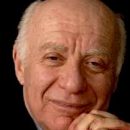 Political autobiographies by senior former officials are notoriously self-serving and economical with the truth. Only the former charge is applicable to John Bolton’s book.
Political autobiographies by senior former officials are notoriously self-serving and economical with the truth. Only the former charge is applicable to John Bolton’s book.
For Bolton is foremost a crusader for a hawkish foreign policy agenda, someone who measures success solely in terms of advancing it rather than in tactical victories in the struggle for position and the ear of the president. The latter is strictly a means to the end of impressing his views on policy decisions/actions. Failures in internecine tussles are openly acknowledged — including the ones that led to his dismissal. So, it is a fair judgment that we accept his depiction of events as accurate — and reasonably complete.
The Room Where It Happened is a meticulous record of deliberation and diplomacy during the time he spent in the White House. Indeed, it records much of what transpired before his arrival since Bolton was a trusted confidante of President Donald Trump throughout — beginning well before his appointment as national security adviser in March 2018.
This is not to say that Bolton’s recounting is dispassionate or wholly objective. His own radical thinking about the United States’ place in the world is never questioned, its premises taken as given, the direction of the courses he advocates un-debated However, the book makes no effort whatsoever to dress them up in anything but their natural garb. He is proud of them and expounds them articulately.
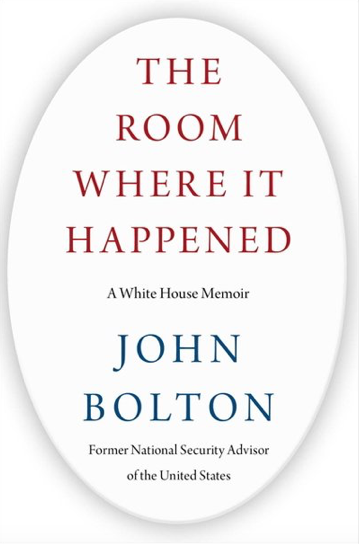 Bolton displays an orderly mind, methodical and logical. Also, unbending in its premises, purposes, and mode of calculating — interests, cost/benefits, risks.
Bolton displays an orderly mind, methodical and logical. Also, unbending in its premises, purposes, and mode of calculating — interests, cost/benefits, risks.
His 500-page, exhaustive chronicle reveals a total inability for detached questioning of these elements. Although highly self-aware about tactics, and the environment in which he is operating, he lives in an intellectual straitjacket.
Bolton is compulsive about detailing in proper sequence who said what, who did what, exactly when and where. That produces an uncommon chronology. Not just day by day, but hour-by-hour – and, at times, minute-by-minute.
How this was accomplished is a mystery. It does all ring true. Anyone who has closely followed American policy abroad in the Trump era will find no serious discrepancies in the Bolton narrative — just elaboration of his (and others’) mindset and the ensuing policies — all of which have been pretty much self-evident to attentive observers. There are noteworthy elisions, especially on Middle East topics and Russia.
For example, the embrace of Mohammed bin-Salman and the White House’s deference to Israeli Prime Minister Benjamin Netanyahu are addressed with no greater attention than the sunrise and sunset. Al Qaeda/Al-Nusra Front in Syria never get a mention; nor does Turkey’s support for ISIS in its formative stage. U.S. participation in the Yemen carnage is ignored as well.
No misstatements or outright lies, though. That in itself created some dissonance between Bolton and Trump. For the president, dealing with someone who knows fact from fiction can be uncomfortable — even if he is circumspect in calling attention to it, and basically sharing your outlook.
Bolton is a different creature from Mike Pompeo — a crude, blustering loudmouth whose sole mission is to ingratiate himself with Trump through amplification of the president’s obsessions. For the secretary of state, the very idea of truth having some sort of priority claim is alien — if not absurd.
Absence of Strategy

Left to right: John Bolton, Donald Trump and Mike Pompeo. (Wikimedia Commons)
The outstanding feature of the foreign policy process and substance exposed by Bolton’s account is the absence of anything approaching strategy.
There is none, not even a hint of one. Instead, the impulsion is generated by dogmatic propositions — never appraised, tenets of belief taken for granted as would medieval seminarians Gospel Truths, and primitive emotions (in particular, Trump’s).
One other additional ingredient in the mix is the instinctive protection of Pentagon interests on the part of the military, e.g. former Secretary of Defense James Mattis; former National Security Advisor H. R. McMaster; Joseph Dunford, former chairman of the Joint Chiefs, et al. That’s it.
Questions of strategic purpose, of shifting contours in global dynamics, of the multifarious intersection of domestic concerns and external relations are never posed — except for the electoral ones which are omnipresent.
Rather, all thinking unfolds within the confines of a rigid, low definition intellectual map; a map whose contours were first drawn by cartographer Paul Wolfowitz in his famous memorandum of March 1992.

Deputy Secretary of Defense Paul Wolfowitz listens to a reporter’s question in the Pentagon on March 1, 2001. (DoD, R. D. Ward. )
The National Goal is simple and blunt: American dominance of the world system. Militarily that means maintaining escalation dominance in every region of the globe; preemptive action to prevent any potential rival to emerge — regionally as well as system-wide; and readiness to use force wherever needed to achieve these objectives.
Diplomatically, the driving force is a relentless, unyielding campaign to keep allies obedient, to organize resistance to any government that is hostile to, or — in key regions — uncompliant with American wishes; to avoid treaties and other formal obligations that could curtail the United States’ freedom of action. Plus, creating a robust capacity to undertake regime-change operations where deemed necessary.
Economically, exploit the country’s unique position as the pivot for the financialized world economy so as to protect our exorbitant dollar privilege, to impose sanctions on targeted states, to use the IMF, World Bank and functional control of the SWIFT money transfer system as instruments of American leverage, and to minimize dependencies/vulnerabilities arising from a lack of technological or resource self-sufficiently.
Curbing China
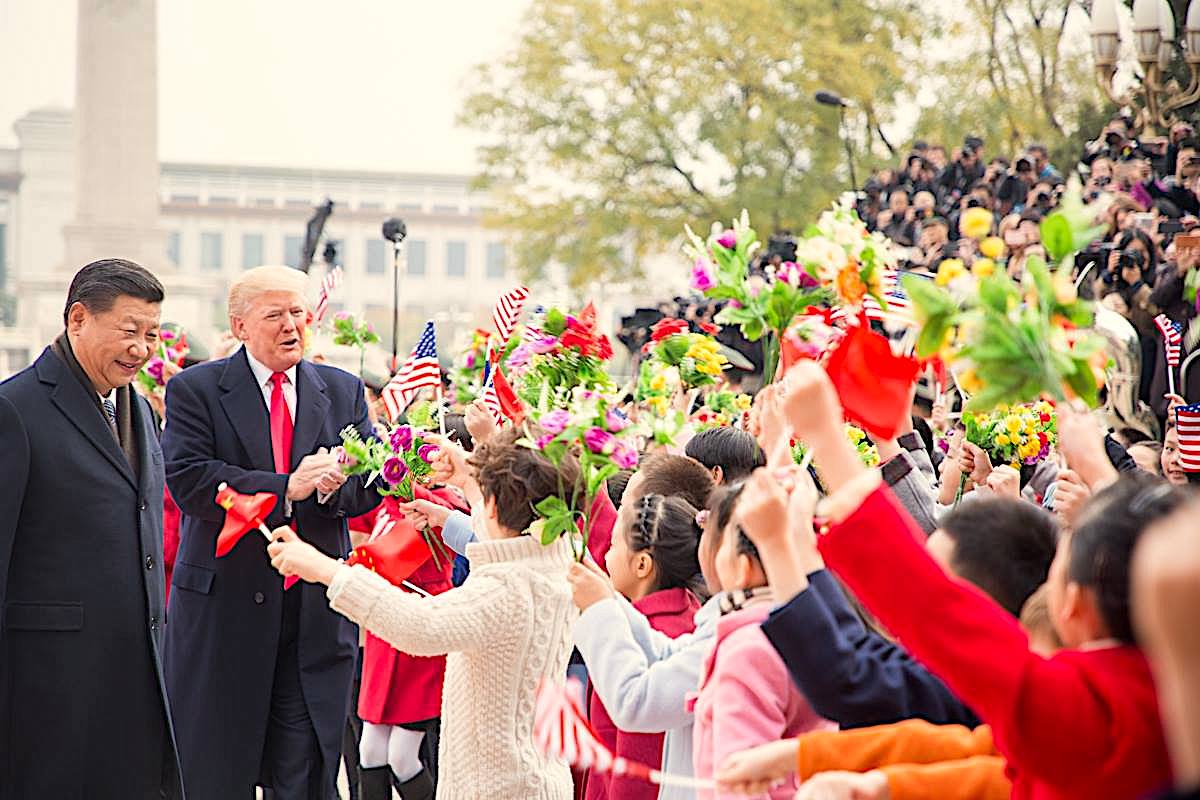
President Donald J. Trump and President Xi Jinping of China, Nov. 8, 2017. (White House, Shealah Craighead)
The closest thing to a strategy is dedication to curbing China. For Bolton, there is an all-out war for global supremacy already underway. To win, the United States must deploy all its resources to hamstring the Chinese economy, undercut the state/market nexus that gives China a structural advantage in the struggle, blunt Beijing’s project of using capital and commerce to extend its global influence, and contain it both militarily and diplomatically by building a cordon sanitaire in South and Southeast Asia.
One can almost hear the incantation: “China must be caged” at the end of each paragraph in his China chapters. Two people in the administration have qualms about this call to arms. One is Secretary of the Treasury Steve Mnuchin; the other is Donald Trump.
The latter has three concerns: bringing the trade balance into line with his notion of a fair deal; basking in the glow of pulling off the biggest deal in history with President Xi Jinping; and helping his re-election by getting the Chinese to greatly expand their importation of American farm products.
The combination theoretically could make him vulnerable to having the wool pulled over his eyes by Xi. Bolton and friends succeed, though, in preventing what they see as dangerous appeasement. Trump’s fleeting attention span and quixotic mood changes made it easy. Covid-19 and Hong Kong sealed it. So, war it has become.
No Other Country Has Legitimate Interests
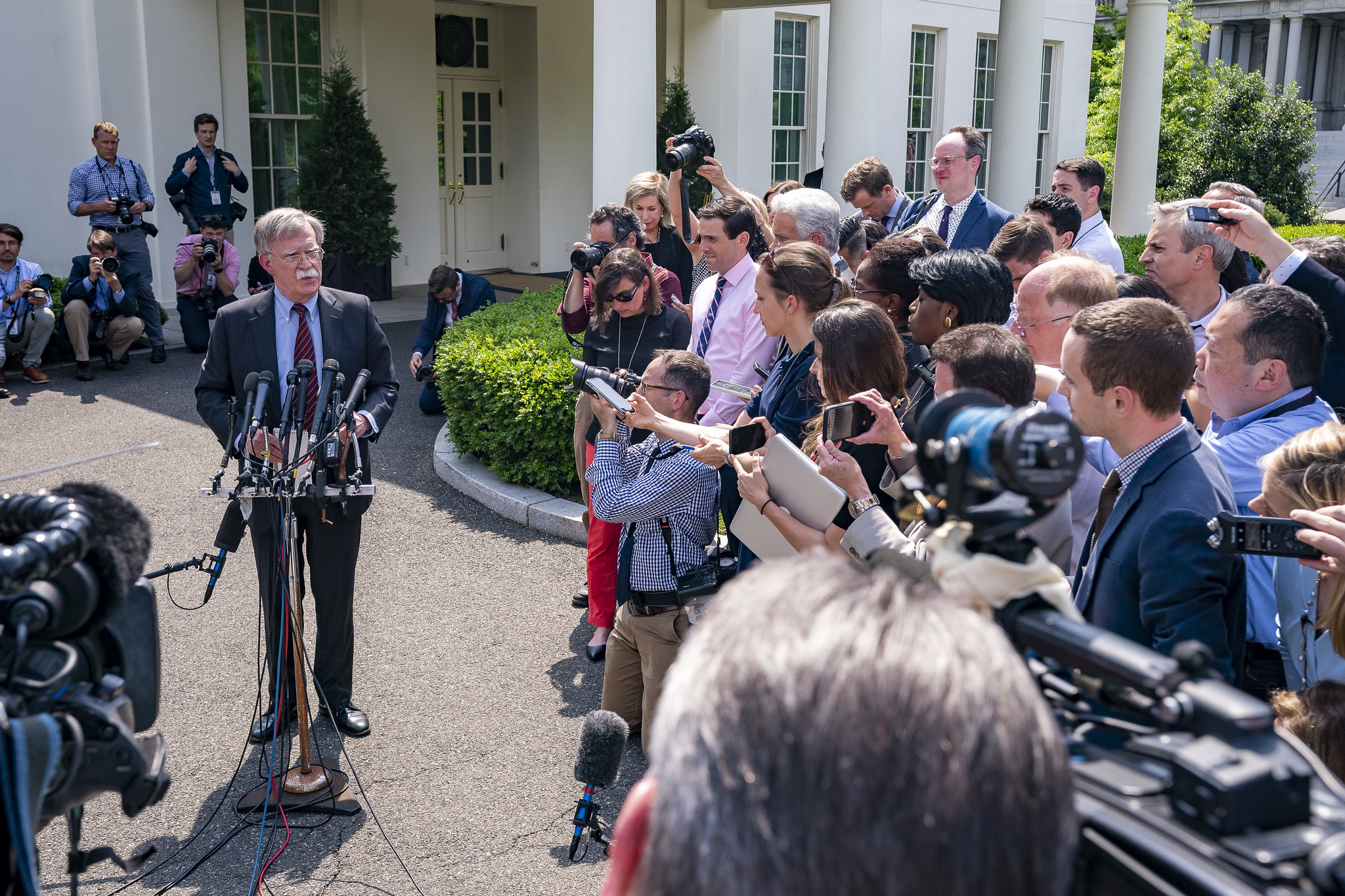
White House National Security Advisor John Bolton speaks to reporters on events occurring in Venezuela, April 30, 2019, outside the West Wing. (White House, Tia Dufour)
No other country is recognized as having legitimate interests that may contravene the encompassing American missions to be custodian of the global commons by serving as the indispensable nation.
The admonition that flows from this conceptual framework is that the United States must dedicate itself to an unceasing struggle to anticipate, to neutralize and to crush all manner of threat. All thinking about America’s foreign policy is overshadowed by this keenly felt sense of threat — both existential and as manifest in plethora of more immediate, tangible threats.
Bolton’s narrative treats us to a disquisition on official Washington’s encounter with never-ending threat: North Korea, Iran, Russia, China, Venezuela. Consecutive, overlapping, intersecting. They monopolize the mental space of the national security team: Bolton, Pompeo, Mattis, Dunford, former Chief of Staff John Kelly, Vice President Mike Pence, CIA Director Gina Haspel – and their associates. Featured enemies act as magnetic poles whose force fields order the entire international system.
The great paradox, of course, is that the country never has enjoyed greater security than it does today. There is no threat to the United States’ territorial integrity or core interests. The implicit threat is to the American project of global hegemony. It is a hegemony different from the traditional pattern of conquest and control, but all the more audacious, and parlous, for that very reason.
In an era of interdependence, of multipolarity marked by the rise of China as a superpower in its own right, of diminished capacity at home – that is a fool’s errand. One that leads inescapably to frustration, failure and then reinvigorated compulsions to pursue the impossible dream.
Scant Attention to Terrorism
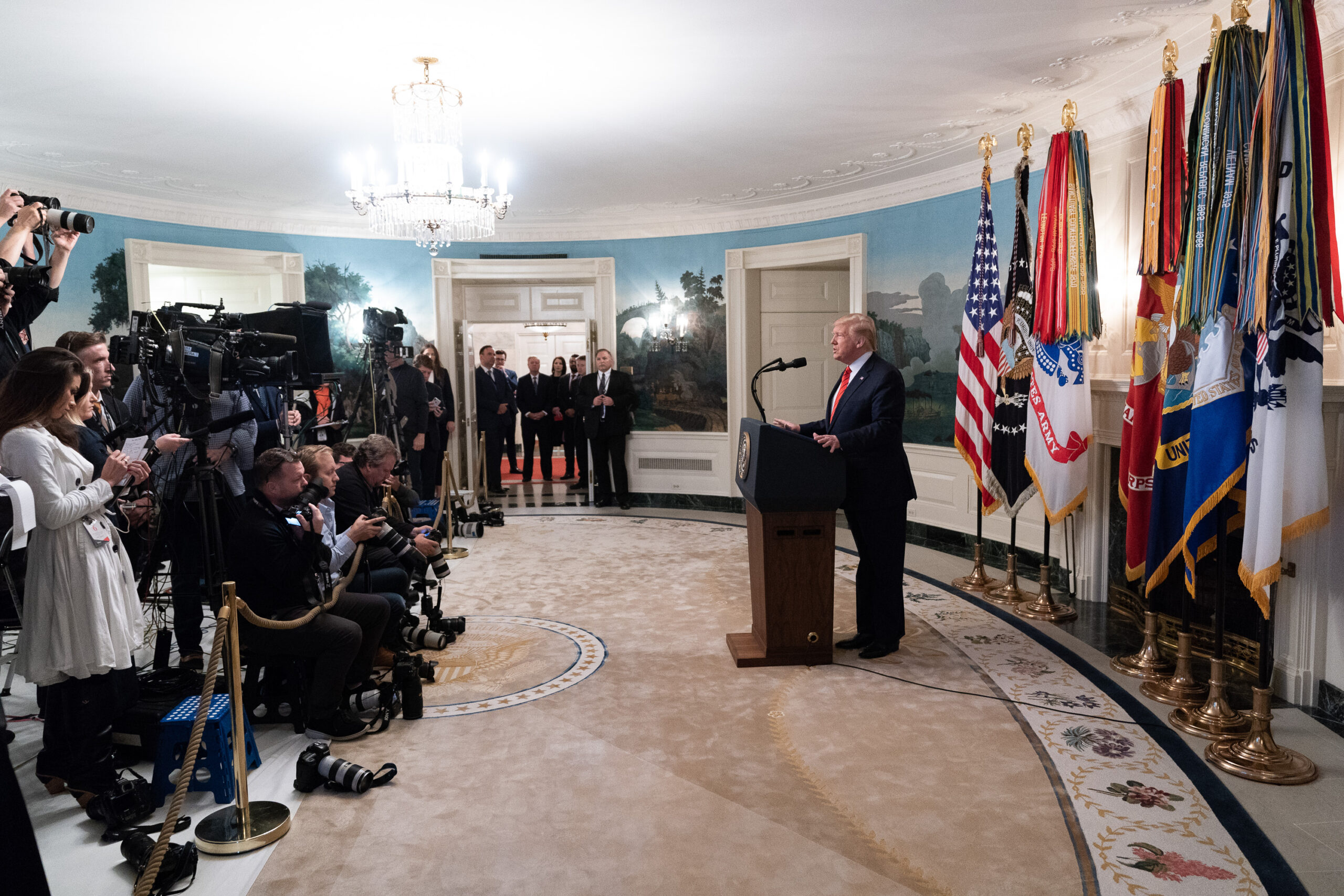
President Donald Trump on Oct. 27, 2019; announcing details of the U.S. Special Operations Forces mission against ISIS leader Abu Bakr al-Baghdadi’s compound in Syria. (White House, Shealah Craighead)
The inconsequence of the absence of a concrete security threat is evinced by the scant attention paid to terrorism by Bolton, and the Trump administration generally. It makes the most modest of cameo appearances: in debates over a continued military presence in Syria and Iraq, as additional reason to crush Iran, in smearing the Russians and Chinese, in justifying rapid switches in our factional preferences in Libya.
Let’s recall that it was ISIS that provoked our jumping back into Iraq with both feet, our tighter embrace of Saudi Arabia and the Gulfies (ISIS’ underwriters), our interventions in Syria, our stubborn folly in Afghanistan. Yet, despite ISIS’ defeat, nothing changes.
We want a large permanent presence – military and political. It’s all about Iran, Russia, Syrian President Bashar al-Assad – not ISIS nor certainly Al Qaeda & Assoc. in Idlib with whom we remain tacitly aligned and whom Turkey, their sponsor since 2012, now employs as their janissaries to carve out a slice of Syria and to realize neo-Ottoman fantasies in Libya.
“Featured enemies act as magnetic poles whose force fields order the entire international system.”
Terrorism, in historical perspective, will have a greatly diminished profile as an actual threat. Rather, it is the consequences of the global war on terror that will bulk large – from radicalization of Salafist extremists in both the West and Middle East-North Africa region, to Europe’s immigration crisis, to the militarization of American society, to providing blanket rationale for operationalizing the Wolfowitz grand strategy with popular domestic backing – however tacit.
American Psyche Threatened

Vigil for George Floyd at Chicago Avenue & 38th Street, Minneapolis, May 30, 2020. (Fibonacci Blue, Flickr)
In truth, it is the American psyche that has been threatened, not its security. The pervasive anxiety felt by many Americans, and magnified in the foreign policy community (which has its own interests and insecurities), stems from the loss of the psychological anchor provided by a deeply felt belief in the country’s exceptionalism and superiority. Shaken by 9/11, mixed initially with genuine fears of follow-on attacks, it has become free-floating and institutionalized.
Those feelings have been exploited by our political elites of all stripes. The autocratic nationalists (e.g. former Vice President Dick Cheney, the entire Trump apparatus) saw it as a heaven-sent opportunity to tilt the separation-of-powers toward an all-powerful executive, the military-intelligence complex as a budgetary buffet, the Israel lobby as the golden key to Washington’s power centers, and the Democrats as a chance to prove their toughness in a way that could brook no internal opposition. Inertia has taken care of the rest.
“There is no threat to the United States’ territorial integrity or core interests. The implicit threat is to the American project of global hegemony.”
The mind-set of John Bolton, and the actions abroad associated with it, are the distillation of this evolution. So, why was he forced out — despite positive personal chemistry with Trump and basic agreement on a chauvinistic foreign policy?
Two peculiarities of Trump’s persona provide the answer. First, there was his rogue attitude toward open-ended prosecution of the campaigns in Syria and Afghanistan. Drawing back from our “endless, expensive wars” was a feature of his 2016 run for the White House. Outright reversal (as opposed to the three-year delay in implementation) could cost him votes in 2020.
The issue never had been a matter of strategic conviction. If former Secretary of State Hillary Clinton, his presidential rival, had taken the dovish position, he likely would have countered with a hawkish stance. The “let’s get out” option appealed to Trump, the tight-fisted businessman.
Gains and losses registered in dollar signs are never far from his mind. They color his attitude toward nearly every bilateral relationship, be it “cheating” China, European contributions to NATO, South Korea’s “free ride” on U.S. forces defending them, how much the U.S. pays each soldier in the Afghan National Army, or the trade balance with Russia. Middle East deployments have been very costly, the tangible benefits invisible, and progress in places such as Afghanistan still elusive, after 18 years. Bad business.
A second Trumpian trait is the attraction he feels for strong, successful men. Himself a clinical malignant narcissist, the man exhibits other pathological features. One is an authoritarian personality. He likes to bully, to hurt, to dominate. He also respects others like himself.
Yet, unlike the clinical ideal type, he does not defer before superiors; indeed, he recognizes no superiors. However, dealing with them as equals enhances his own sense of self-esteem. His out-sized ego is fissured by insecurities. Deep in his psyche is a dim awareness that he is a phony, a cheat, a coward. So, he is susceptible to the celebrity syndrome.
People who are celebrated for their prowess can ease those vulnerabilities — by demonstrating respect for him. Hence, the attraction of Russian President Vladimir Putin; of North Korean leader Kim Jong-un; of Netanyahu, of the Saudi leaders; even Turkey’s President Recep Erdogan, whose madness he tolerates. Xi initially exercised some of the same appeal; now dormant, it could be rekindled because Xi is Xi – master of the rival superpower.
All of these leaders are more savvy, more self-aware, and surely more intelligent than Trump. They know how to play his complex personality. It is less a matter of “using” Trump (Netanyahu, Mohammad bin Salman, aside) than it is a desire to inflect his attitude and behavior so as to avoid catastrophe provoked by the fecklessness of the deranged man in the Oval Office. They (and German Chancellor Angela Merkel, too) treat him as one would somebody who is wearing a belt of nitroglycerine.
Trump’s Erraticism
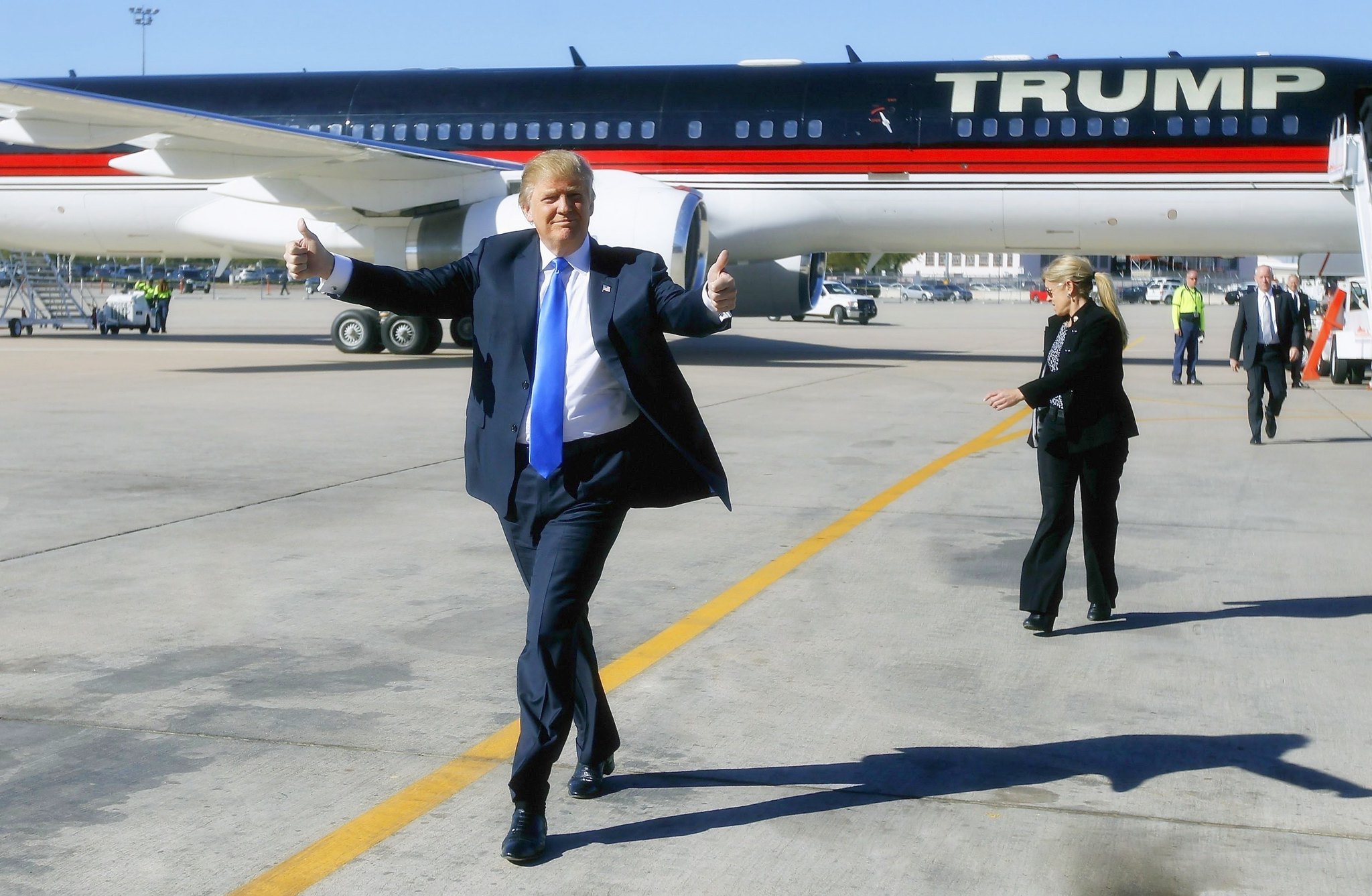
Trump campaigning in 2016. (oriana.italy, Flickr)
Trump’s erraticism, his compulsions and fixations, is what generated the friction with Bolton. Much of Bolton’s energy went into desperate campaigns to prevent Trump from taking “mis-steps.” They all involved doing things that erred in the direction of softness.
Heading the list were: repeated pronouncements of a desire to withdraw from Syria; repeated pronouncements that it was time to pull down the curtain on our Afghan misadventure; the meeting with Kim Jong-un and any indication of readiness to loosen sanctions and political isolation; meeting with Putin, silence about alleged Russian interference in American domestic affairs or alleged human rights abuses; anything that smacked of concessions to China on commerce or human rights; restraint in backing coup attempts in Venezuela – among others.
“In truth, it is the American psyche that has been threatened, not its security.”
On the most critical matters, i.e. Russia and North Korea, Bolton had the full collaboration of every other member of the administration’s national security team. When they failed to rein in a headstrong Trump, they undercut his initiatives and managed to sabotage their implementation.
Their outstanding achievement was their success in voiding the terms of the Singapore Declaration reached with Kim Jong-un. Trump was too quixotic, distracted, and ambivalent about the substance to press ahead regardless – even though he vaguely recognized how much he had been manipulated.
The Pentagon in All of This
What role did the generals play? The Pentagon attitude irritated both Trump and Bolton. In terms of American military engagements abroad and the use of force (re Iran, North Korea, Venezuela), their objective was to “flatten the curve.” That translated into: staying the course in Syria, Afghanistan, Yemen; doing nothing that might jeopardize their network of bases. The status quo served their purposes well.
No acknowledgement of mission failure, lots of activity that justified inflated budgets and big promotions, unmatched training opportunities and scrimmages, minimal to non-existing casualties, participation of all four services, and a de facto veto on any new, risky operations. So, while they shared the global perspective of Bolton and the others, they were far more cautious and prudent.
Bolton’s preference, of course, was a gung-ho, full steam ahead, assault on all fronts. His answer to the Korean nuclear issue was a preventive strike on all their nuclear facilities combined with a massive bombing of their artillery and tank concentrations so as to keep South Korean casualties down to an acceptable level. “Acceptable to whom?” was not a question he asked.
In Afghanistan, he advocated escalation; the country could not be left to the Taliban with the danger of a 9/11 repeat. (Why would some terrorist group need Afghanistan when there were 40 other places where an attack could be organized? Neither Bolton nor his colleagues posed the question).
Hold tight to the alliance with the Kurds but ignore Turkish sustenance of Al Qaeda/al-Nusra Front in Idlib. Place priority on getting rid of Assad – an Iranian asset – by any means necessary. (Example: destroy his entire air force in retaliation for the false flag Douma chemical attack).
Play hardball with Baghdad to make sure it could be treated as a protectorate and expel Iran. As to the latter, intensify pressure and keep the military card on the table. Venezuela: a more active role for the U.S. in plans for a violent coup against President Nicolás Maduro.
The generals dragged their feet or blocked outright the war options. At the same time, they hamstrung Trump’s episodic moves on leaving Afghanistan and Syria. Inertia won out.
The Final Straw
The break-up between Trump and Bolton took place in early September. It had been brewing for some time. Bolton was already on the very brink of resigning in August in protest over a contemplated meeting between Trump and Iranian Foreign Minister Javad Zarif sponsored by French President Emmanuel Macron at the time of the G-7 summit.
He also was aggrieved by Trump’s backing away from planned airstrikes against Iran in response to their shooting down of an American drone. To his mind, this perceived American weakness jeopardized achieving the goal of eliminating totally the prospect of Iran’s acquiring a nuclear capability – a security imperative – via regime change.
What was the final straw? Perhaps, the peace deal with the Taliban, which Bolton fiercely opposed – punctuated by the fiasco of the planned celebration at Camp David. A prelude to the Nobel Peace Prize Trump craved in his imagined status competition with former President Barack Obama. Nobody but Trump wanted it.
In fact, the White House heavies so feared a Taliban physical attack on the president that they insisted on redundant metal detectors and chemical detectors. Pence would be held in Washington given the possibility that the Afghans might throttle the “O” with their bare hands.
The ignominious collapse of the talks seems to have increased Trump’s growing animus toward Bolton. It had been carefully stoked by the new Chief of Staff Nick Mulvaney who was intent on expanding his power.
Mike Pompeo, who read Trump’s humors skillfully, and who oversaw the Taliban opening, lent his heft to the negative side of the scale. Jared Kushner, Trump’s son-in-law and adviser, too, wept no tears at his departure. In the end, it was the convoluted workings of the Trump psyche that led to Bolton’s tanking. For Trump, firing people is one of life’s most gratifying experiences. Everyone close to him gets fired sooner or later – usually sooner.
What difference did it make for American foreign policy? Not much.
Michael Brenner is a professor of international affairs at the University of Pittsburgh. mbren@pitt.edu
The views expressed are solely those of the author and may or may not reflect those of Consortium News.
Please Contribute to Consortium
News on its 25th Anniversary
Donate securely with  PayPal here.
PayPal here.
Or securely by credit card or check by clicking the red button:

American dominance of the world…
Well, I think that just might be behind what has been adopted as an official slogan at the Pentagon: “full-spectrum dominace.”
It is a frighteningly Nazi-like slogan, but it is official American policy well into the 21st century.
And how do so many “creatures of the night” come to power in America, as Bolton, Pompeo, Abrams, Grenell, and Trump?
They represent the very types, had they been born a little earlier and in Europe, who would have “worked towards the Fuhrer,” a common popular slogan in 1930s Germany.
That isn’t even the slightest exaggeration. Just the observation of someone who has been a lifelong student of history and biography.
It was the great American journalist and writer, William L. Shirer, who once remarked that perhaps America would be the first nation to go fascist voluntarily.
He too was not exaggerating. He was an exceptionally able observer who covered Hitler and the Nazis before the war for the Chicago Tribune.
There was the Bund movement in America, quite a large one, even with a kind of Hitler Youth group, indistinguishable in their uniforms from those in Germany. There were the American eugenics laws, which came before those in Germany and involuntarily sterilized many thousands of “unfit” Americans.
There, of course, was the KKK in its heyday, and lynchings were common enough still in the 1930s that Eleanor asked Franklin to do something about them, but he felt it was politically impossible. Few Americans today know that in parts of the South, a lynching in the town square was sometimes the occasion for family picnic gatherings.
There was the founder of Shirer’s own newspaper, “Colonel” Robert McCormick, an intensely right-wing figure. Henry Ford, who published an appalling book about the Jews and a man Hitler admired, keeping a photo of him in his chancellery office. The Rockefeller Foundation’s financial support for eugenics. The heads of many major American corporations who gave valuable assistance to Hitler’s government. IBM’s strategic alliance with the Nazi government notably contributed to the efficiency of the eventual work of the Holocaust. Personalities like public hero, Charles Lindbergh, and Wallis Simpson, a keen Hitler admirer, the woman who would marry the British King. Walt Disney used to send copies of his latest cartoons to Mussolini, who was very fond of them.
The current President’s father, Fred Trump, was an open advocate of racist and fascist views. He associated with the KKK in New York and refused renting apartments to black people in his buildings. Given some of his son’s godawful pronouncements and appointments, I think it would hard to say the President, Fred’s favorite son and heir, was not significantly influenced by him.
The father and grandfather of two American presidents, Prescott Bush, banker and later Senator, worked for Brown Brothers Harriman (another eminent American name), a firm which assisted the Nazi government’s financial arrangements through its relationship with Fritz Thyssen, German industrialist and important early Hitler supporter. Bush was on the boards of some Thyssen companies designed to move assets around for Hitler’s rearmament efforts in Germany.
There’s a rich vein of American history supporting the likes of John Bolton. And, while widely unknown, I think for many who do know, it is no more disturbing than statues of John C. Calhoun or Confederate leaders in the town square.
I also believe that a great deal of the motive force in the current vicious economic and psychological war against China reflects racial prejudice. It has become almost fanatical in character, giving off the stink of hatred, as in, “How could ‘they’ possibly compete with us without cheating and lying and stealing?”
Bolton is not a lone wolf. His mentors are primarily Souther Right Flag wavers and more imporanty a huge number of primarily Christian Zionist “Dominionist ”
Very very few of our top State and Federal elected or appointed that do not have mentors from early on in both scooling and later job placements.
Example: Hillary Clinton major mentor was Madeline Albrights Dad, Condolesa Rice and susan Rice, not related, Both had Madeline Albright as mentor.
Both Hillary Clinton and Kofi Anon went same advanced schools of intrrnational study under very same scholarship programs.
Farm in Texas where Cheney accidently shot a guy was sa.e family related to. lady Bird Johnson that propelled Both Bush, Cheney political.carreer and many another Southern and Texas political figures careers.
corporate and political think tanks lend support to individuals both befor attai ing powerful fed positions and lucrative.speaking engagements and Dean or Proffessorships at multiple universities NED , Federalist Sociery, (most tightly mentored group outside military and US security), CFR and many others.
each individual mentoring one or more ambitious butt kissers.
It was a wonderful trip racing (at a distance) through the certifiably insane minds of those ‘intellectually superior” (their early Wikipedia description of themselves) neocons bent on dominating the world. Who raised these Bolton’s, Wolfowitz’s, Richard Perle’s to think one ‘people’ could dominate all others on the planet?
Whaddya mean “quixotic mood changes”? Cervantes’ Don Quixote de la Mancha does not record a single mood change in Don Quixote.
Some say imperialism and empire are the same thing but when I look at America I see a difference. Imperialism is military power sent abroad by men no different from thugs to kill and plunder and expand their turf. Empire at least made it to rule some periods of peace. It had some finesse. America has none.
When Balton was doing his thing re Iraq he was described as a kiss up kick down kind of guy Somehow that changed with Trump who was seen as an impediment to his world dominance fixation. I think on foreign policy he assumed that he was in charge, not the President. It didn’t work.
The mystery to me is why Trump hired the guy in the first place. If anyone was capable to assume the role of Dr. Strangelove, this McDonogh graduate was it.
We should all be extremely grateful that he is the “former” security advisor. I actually think it’s bizarre that, after his career of pushing us to the brink of every war imaginable, he is given some measure of legitimacy with this damn book. Of all the great books there are to read, this should be the last one to waste time on. Put it this way, if Bolton had his way over the last two decades, we’d probably, if we all survived, be engaged in WWIII at the moment. Even a madman with the most sinister intentions can have a methodical mind, all the more reason to ignore him.
The US has made no secret of its attempt to dominate the world physically and financially. “America first” states plainly that it’s to be a master/slave relationship.
It’s all those countries that accede to this claim of dominance that astound me. By doing so they yield to financial colonialism and relegate their populations to second-class world citizenship.
What’s even more astounding is that they expect us to thank them for it.
The few sociopaths that control Empire (not just the US) want world domination. The US MIC is their tool, and the MSM is their propaganda organ. Most ordinary, sane people the world over (including the US) just want to live in peace.
This was meant in reply to PressTVDotComFan
Dominance is the dream of every empire – for a while achieved – but eventually always lost. The desire for “global supremacy” has America on course for war with China – a world war. President Trump may have qualms about this dangerous confrontation, preferring compromise. Unless the desire for power is compromised world war will be inevitable. For more on this search: ghostsofhistory.wordpress.
Advisors, Consultants, etc. Where do these ‘people’ come from, how do they burrow their way into positions of influence ?
What real training, experience and education in their fields do these people actually have ? Or is just being the biggest bastard the only qualification ?
Where are the good people, the rationale people, the educated and qualified people ? What does it say about our modern world that we are ‘happy’ to be ruled by these dysfunctional, evil people ?
If evidence was ever needed that democracy is a scam to appease the masses here it is right in our faces, I despair !
The scum always seems to rise to the top.
I want to agree with @ Andrew Thomas in not wanting to read about this chronicle of chicanery, duplicity, and incompetence. That said, I’d like to point out a couple of things that I suspect are missing in the book because they are completely missing in the review. The concept of for every action there is an equal and opposite reaction (sorry, I’m a physicist) does not enter into their thinking. The US is a childish country and doesn’t understand that a lack of an immediate reaction doesn’t mean one isn’t coming. When it does come, we won’t like it.
“In Afghanistan, he advocated escalation; the country could not be left to the Taliban with the danger of a 9/11 repeat.”
Right.
Like any semi-sentient being, including Bolton, still believes that 9/11 was pulled off by OBL from a cave in Tora Bora.
Ditto his “demise” in Pakistan.
All in all a nice bit of writing when it didn’t wander off into psycho-sleuthing Trump’s amygdala.
Thanks for writing all of the good parts.
I once saw a YT clip of him on Tucker Carlson. The Tuck made him look like an idiot.
Two idiots talking together. That must have been enlightening!
Thank you for reading this lunatic’s book so that the rest of us can be advised but don’t have to do it ourselves. I have too many anger issues to put myself through that torture. If there is a God, he/she/it loves you all the more for taking this upon yourself.
Ditto on the thanks. Good riddance to Bolton.
My thought also Andrew T. We should probably remember the prof at Christmas or something. I couldn’t fully avoid seeing Bolton on my teevee when all the beltway boobs were aflutter about this book’s release, but I could tell that, under the cover of the at-large public’s outrage over Trump, what Bolton was really miffed about was that Donald wasn’t as batshit crazy as he IS.
For some reason, I just thought of one of those scenarios where you’re on a boat or a plane that is floundering, and if you have to pick one person to jettison, he’d be the unanimous choice. “And take your notebook too, please.” Didn’t mean that as an analogy, but that can’t be helped.
Andrew Thomas,
Double-ditto.
A true and trustworthy comrade of the war based economy, a hero of corporate nation building and a dedicated globalist who tirelessly pursued America’s empire at the cost of many innocent live. And where will we find him next – CEO of a defense contractor? Joining the CFR or Trilateral Commission? Or maybe heading a nonprofit NGO overthrowing governments like Ukraine.
Dear Lord, please tell me we have seen the last of this evil man.
Clearly the US wants world domination
Interesting overview, but I take exception with the description of Pompeo as “a crude, blustering loudmouth whose sole mission is to ingratiate himself with Trump through amplification of the president’s obsessions.” In my view, Pompeo is a dangerous ideologue (or if not driven by ideology, dangerously subservient to the concepts of ideologues) in service to the extreme right winger, Sheldon Adelson. One shouldn’t let the fact that he is also a crude, blustering loudmouth detract from the danger he presents to the world.
Yes, indeed, Pompeo executes plans of people like Sheldon Adelson, but all are in step with the CIA, Pentagon, and corporations. Fall out of step and your career goes south. So far, the world has lost its chance to scatter the CIA to the winds.